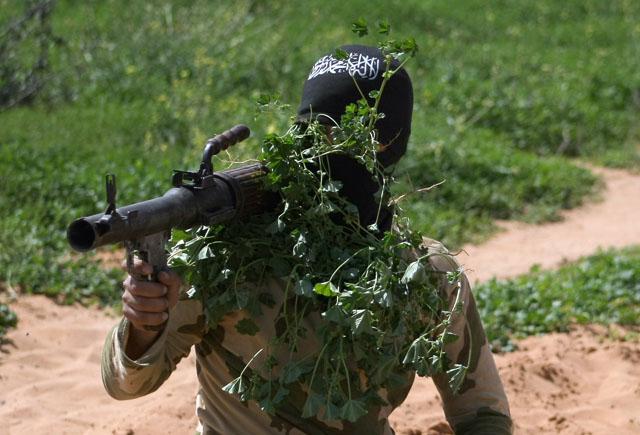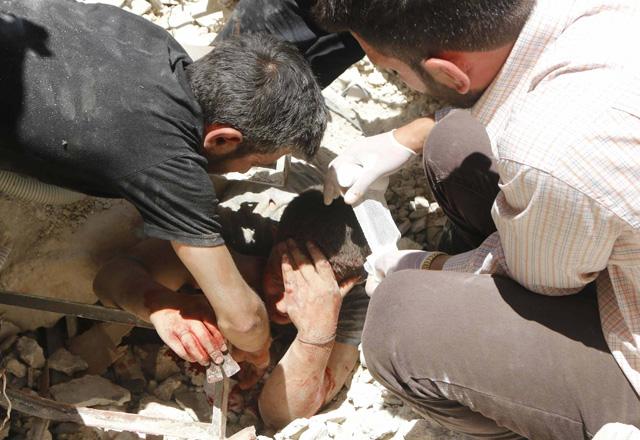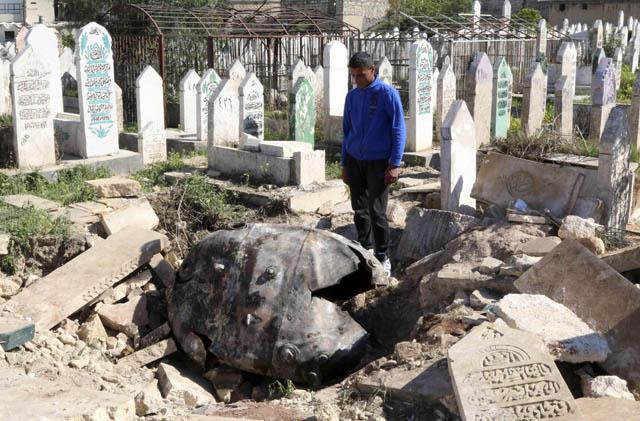You are here
Syrian army crushes rebel push near Turkish border
By AP - Jun 15,2014 - Last updated at Jun 15,2014
BEIRUT — Government forces flushed opposition fighters from their last redoubts in northwestern Syria near the Turkish frontier on Sunday, capturing two villages and restoring government control over the border crossing, activists and state media said.
The military’s advances fully reversed the gains rebels had made during their three-month campaign in Latakia province, the rugged coastal region that is the ancestral heartland of President Bashar Assad. The counter-offensive’s success is the latest blow to the rebels, who have suffered a string of bitter recent setbacks in Syria’s more than three-year-old civil war.
Islamic rebel factions launched their surprise assault in Latakia in March, pushing south from the Turkish border to seize a string of villages in the lush, mountainous terrain. The military, nervous about an incursion in a bastion of government support, dispatched reinforcements to blunt the rebel advance and eventually turn the tide.
On Sunday, after months of bloody clashes, army troops backed by fighters from the Lebanese Shiite military group Hizbollah seized the seaside hamlet of Samra before also taking the village of Kassab and its adjacent border crossing, said Rami Abdurrahman, the director of the Britain-based Syrian Observatory for Human Rights.
He said there were minor clashes still taking place west of Kassab, a predominantly Armenian Christian village whose residents fled after the rebels seized control.
The Syrian army command issued a statement saying that it “restored security and stability to Kassab”. It also said the operation “smashes the illusions” of the rebels securing a sea port in Samra or a buffer zone along the border to use as “a base for launching terrorist acts against the Syrian people”.
The government refers to those trying to topple Assad as “terrorists”.
Lebanon-based Al Mayadeen TV, which has a reporter embedded with Syrian troops, broadcast live footage from Kassab that showed a blown-out stone building with a smoldering wooden staircase. Soldiers in camouflage uniforms milled in the streets, and the rocky hills typical of the area could be seen in the background.
Engineering units were clearing mines and dismantling booby traps in Kassab, Syria’s pro-government Al Ikhbariya TV said.
The government made dislodging rebels from Latakia a priority for strategic as well as symbolic areas. The coastal province is a stronghold of Assad’s minority Alawite sect, which is an offshoot of Shiite Islam, and losing control of even a portion of it was an embarrassment to the government.
Now in its fourth year, Syria’s conflict has spilled far beyond the country’s borders to shake the foundations of the Middle East.
Last week, an Al Qaeda breakaway group known as the Islamic State of Iraq and the Levant, which holds much of northern and eastern Syria, overran huge swaths of neighbouring Iraq and captured the country’s second-largest city.
In the wake of its onslaught, the jihadi group has pillaged Iraqi military bases, carting off Humvees, ammunition and other weapons. The militants have transferred some of that materiel to Syria to bolster their forces there.
The Syrian air force has not targeted Islamic State territory with the same ferocity as it has other rebel factions. But on Saturday and Sunday, government aircraft bombed facilities belonging to the extremist group in Hassakeh province bordering Iraq and in the groups’ stronghold of Raqqa province, the observatory said.
Abdurrahman said the Syrian military appeared to be wary of the Islamic State possessing high-grade military equipment. Among the places targeted by the air strikes was Shaddadi, a town just across the Syrian border from Iraq that activists say is a hub for the movement of men and equipment across the frontier.
Also Sunday, the state news agency said that some 230 prisoners were freed under a general amnesty declared by Assad following his re-election in Syria’s June 3 vote. SANA said the prisoners were released from lockups in the central cities of Homs and Hama, as well as the northeastern province of Hassakeh.
The observatory confirmed that detainees were released Sunday, although it could not provide exact numbers. The group said that more than 1,500 people — a mix of anti-government activists and common criminals — have been freed under the presidential amnesty since it was announced on June 9.
International rights groups say there are tens of thousands of anti-government activists, protesters, opposition supporters imprisoned in the country. It is not clear how many of them will be covered by the pardon.
Related Articles
Syrian rebels pressed their offensive deeper into the coastal heartland of President Bashar Assad’s Alawite sect on Wednesday, battling government troops backed by warplanes for control of at least two villages in the heavily wooded and mountainous terrain, activists said.
Residents of the Armenian Christian village of Kassab on Syria’s border with Turkey began returning home on Monday, dancing, cheering and waving flags in the main square a day after the army retook the area from rebels.
Syrian forces on Thursday bombarded rebel positions with artillery and warplanes in the Mediterranean coastal province of Latakia, trying to push back opposition fighters who over the past week made rare territorial gains in President Bashar Assad’s ancestral heartland.

















